 Petzlover
Petzlover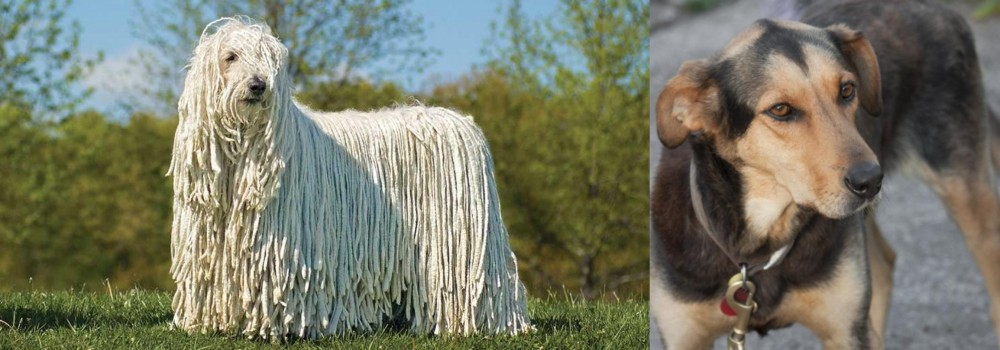 Komondor is originated from Hungary but Huntaway is originated from New Zealand. Komondor may grow 10 cm / 4 inches higher than Huntaway. Komondor may weigh 14 kg / 31 pounds more than Huntaway. Both Komondor and Huntaway has almost same life span. Komondor may have more litter size than Huntaway. Komondor requires High Maintenance. But Huntaway requires Low Maintenance
Komondor is originated from Hungary but Huntaway is originated from New Zealand. Komondor may grow 10 cm / 4 inches higher than Huntaway. Komondor may weigh 14 kg / 31 pounds more than Huntaway. Both Komondor and Huntaway has almost same life span. Komondor may have more litter size than Huntaway. Komondor requires High Maintenance. But Huntaway requires Low Maintenance
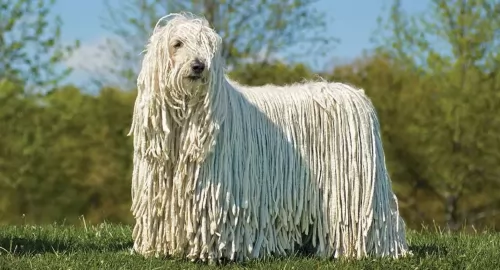 Looking like a giant mop, and sometimes being referred to as 'mop dogs' the Komondor, known also as the Hungarian sheepdog, hails from Hungary.
Looking like a giant mop, and sometimes being referred to as 'mop dogs' the Komondor, known also as the Hungarian sheepdog, hails from Hungary.
The dog was brought to Europe centuries ago so he is a well established breed. It has been declared as one of the country's national treasures.
He is a dog related to many other dogs such as the Pulim the Ovcharka, the Bearded Collie, Old English Sheepdog and others.
 The Huntaway or New Zealand Huntaway is a herding dog that originated in the New Zealand sheep country. Their main purpose is to drive sheep and they are not an old breed. They were developed late in the 19th century for their working skills. The only real criteria was that they were black and tan. A dog must win a trial in order to be placed in the New Zealand Sheep Dog Trial Association studbook. They drive sheep mainly through their deep, loud voice.
The Huntaway or New Zealand Huntaway is a herding dog that originated in the New Zealand sheep country. Their main purpose is to drive sheep and they are not an old breed. They were developed late in the 19th century for their working skills. The only real criteria was that they were black and tan. A dog must win a trial in order to be placed in the New Zealand Sheep Dog Trial Association studbook. They drive sheep mainly through their deep, loud voice.
In the New Zealand high country there was a need for a working dog with stamina, agility and intelligence to work the sheep as a drover (herder). The dog had to be able to handle rough, steep land and work with very large groups of sheep. The sheer area of land that the sheep graze and the dog would have to cover, demanded that this dog have stamina and strength to cover large pasture land and work for days if necessary. Before this the shepherds had used British sheepdogs but they preferred dogs that barked while working. So they bred the British Sheepdogs with Collies, Border Collies, Labrador, Rottweiler, Doberman and other barking sheepdogs to create the Huntaway. In addition to the bark, they bred for stamina and size.
They were participating in field trails in 1870 and ads for them were seen in newspapers by 1884. They became a separate breed in the 20th century. Today they are spreading around the world and are becoming very popular. It is not recommended that they be kept as pets however, since they are true working dogs.
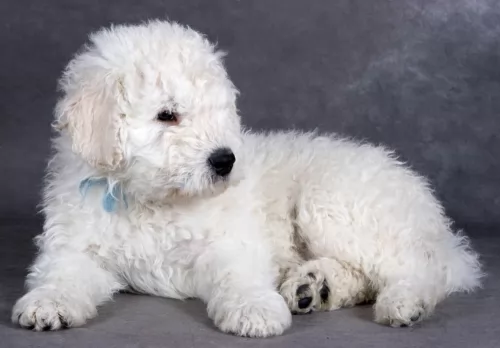 Known for his unique long corded, singular white coat, the Komondor, a molosser dog, is large. Females start at 64cm in height and both males and females can reach up to 76cm in height.
Known for his unique long corded, singular white coat, the Komondor, a molosser dog, is large. Females start at 64cm in height and both males and females can reach up to 76cm in height.
This unusual coat of theirs is wavy and actually forms cords or dreadlocks as the dog matures. You can't easily see the dog's face because of all the hair.You also can't see the tail easily, in fact you might think he hasn't got a tail as it is obscured by the hair. The tail is medium length and held low.
He has a large head, dark brown eyes, and floppy ears. The coat is certainly going to require grooming even though the dog doesn't shed much. His body is robust and well muscled with the body being slightly longer than the height of the dog.
The Komondor has been a dog used for guarding livestock, and while his character is calm and balanced, when the livestock is threatened, he can show another side – more aggressive – as he defends his flock. He makes an excellent watchdog.
He is an affectionate dog with his human family, being a gentle playmate of children. He is slightly reserved and wary of strangers, and is willing to guard and protect his human family from them.
He is also good with other family pets. When you look at him you might think of him as not being very energetic, but he is an athletic dog, fast and powerful. Because of his size and speed, it is best to have him trained and socialized as he can be obstinate. Training him makes him obedient.
 The Huntaway is a large dog with a deep chest and a black and tan coat. They are strong, big and muscular with voices to match. They herd, head, work the sheep in pastures and force them into pens. They are bred to have that big authoritative, deep bark. They do not yap. Their bodies are well proportioned but longer than high. They have well - padded feet and a deep chest for stamina, along with strong legs and body that allows them to run fast and change directions at will.
The Huntaway is a large dog with a deep chest and a black and tan coat. They are strong, big and muscular with voices to match. They herd, head, work the sheep in pastures and force them into pens. They are bred to have that big authoritative, deep bark. They do not yap. Their bodies are well proportioned but longer than high. They have well - padded feet and a deep chest for stamina, along with strong legs and body that allows them to run fast and change directions at will.
The tail of a Huntaway if long, while their heads are shaped like blocks while the muzzle is long and the nose is black. They have dark, round eyes and long ears. An unusually attractive dog, they have dense fur with fringe on the tail and chest. There is characteristics a very large variety in the in the way the breed looks from one dog to the next. Thus they do not participate in confirmation events, as the standard is based on working characteristics rather than appearance guidelines. They are more a “class” than a “breed”.
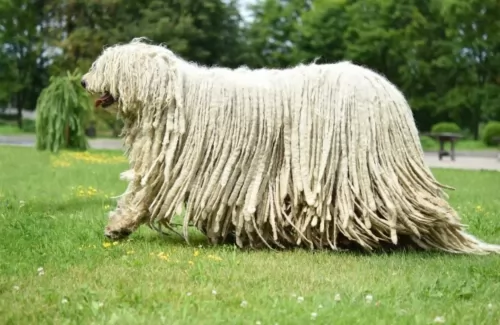 The Komondor is known for his strong guardian characteristics, especially with his human family. He is loving and loyal towards them while being wary of strangers.
The Komondor is known for his strong guardian characteristics, especially with his human family. He is loving and loyal towards them while being wary of strangers.
True, his coat can make people think twice before making this dog a pet, but if you're game and ready to attend to his coat, he can make an excellent family pet. They're fine with other pets too, and he is also an intelligent dog, capable of being easily trained.
He needs a good deal of exercise and can become noisy and destructive without the right amount of stimulation. If you do your part with the Komondor and provide him with a loving, caring home, he will be an awesome pet and guard you with his life.
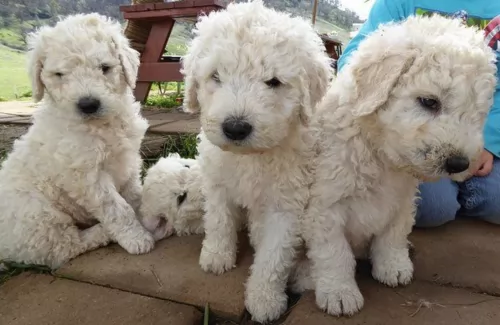 The Komondor is a healthy dog breed who can live to be 10, 11 or 12 years if you look after him well. There aren't any known genetic disorders prominent with the dog, but it pays to know about some of those that could strike -
The Komondor is a healthy dog breed who can live to be 10, 11 or 12 years if you look after him well. There aren't any known genetic disorders prominent with the dog, but it pays to know about some of those that could strike -
This is an irritating eye problem where the eyelash rubs up against the eyes.The result can be scratching of the cornea and eye infections. It is an eye problem which can be corrected with surgery.
Hip dysplasia is a serious genetically inherited disorder and common in large dog breeds. It is caused by a malformation of the hip joint. It can cause problems for the dog, weakening the hip and making it incapable of supporting the weight of the dog.
It also leads to pain for the dog, difficulty with moving and even total lameness. Weight, size of dog, age and genetics are all factors which can increase the dog's likelihood of developing hip dysplasia.
Whimpering, lethargy and refusing to put weight on the leg are common signs of hip dysplasia and your vet will go ahead with ways to relieve the pain and symptoms of your Komondor.
 The Huntaway is a pretty healthy breed, developed as it was from the sheepdogs and collies. They still face some inherited issues such as:
The Huntaway is a pretty healthy breed, developed as it was from the sheepdogs and collies. They still face some inherited issues such as:
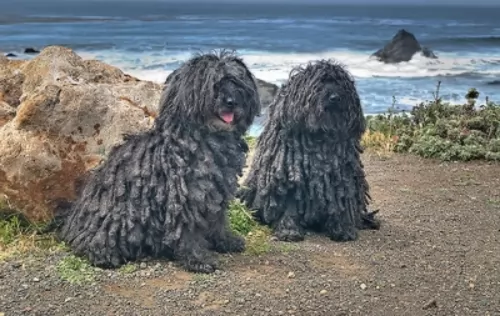 The Komondor is most certainly not a low maintenance dog with that extraordinary coat.Before the dog turns 1, the coat begins to form its cords. These cords can become discolored and matted, In fact the cords will need to be separated to keep the dog clean and free of matted hair.
The Komondor is most certainly not a low maintenance dog with that extraordinary coat.Before the dog turns 1, the coat begins to form its cords. These cords can become discolored and matted, In fact the cords will need to be separated to keep the dog clean and free of matted hair.
For those who keep the dog as a pet and who don't want him to be a show dog, he can be trimmed, otherwise the coat and its maintenance could turn out to be a real issue.
Of course once the distinctive coat has been sheared, he loses that typical and recognizable Komondor look.
Check his ears on a regular basis for wax- and dirt buildup so as to prevent ear infection.
Teeth need to be checked regularly to prevent tartar buildup and if you don't have the time or the knowledge to keep his teeth clean and maintained, take him to the vet as the teeth-treatments they do there will promote healthy teeth and gums.
 If you are not using your Huntaway to herd, then feed a medium formula not a high protein, high calorie formula. Feed 3-4 times a day and 1-2 cups.
If you are not using your Huntaway to herd, then feed a medium formula not a high protein, high calorie formula. Feed 3-4 times a day and 1-2 cups.
3 cups per day feeding twice a day high quality medium calorie food.
Exceptional stamina
This herding breed has a great need of mental and physical stimulation. They were born to herd and to do so over vast tracts of land in challenging conditions. They need to be challenged. They need daily exercise at a very high level. A Run them every day or take them on a couple of long walks. They will excel in field trials, Barnhunt, agility and rescue. They love to learn.